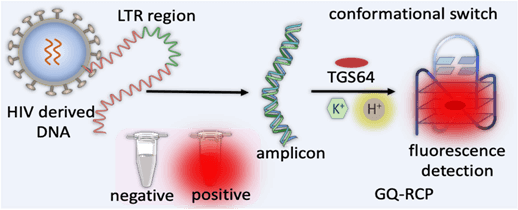Researchers at the Jawaharlal Nehru Centre for Advanced Scientific Research (JNCASR) have developed an innovative diagnostic platform for targeted and reliable detection of HIV, using a fluorometric test that identifies a distinctive DNA structure called G-Quadruplex (GQ). This breakthrough technology promises to significantly reduce false positives in HIV diagnosis.
HIV-1, the virus responsible for AIDS, remains a global health challenge, with current diagnostics often struggling with early detection, false positives due to cross-reactivity, and prolonged processing times. Many nucleic acid-based tests face limitations, as their probes cannot reliably distinguish between specific and nonspecific DNA sequences, leading to diagnostic inaccuracies.
As per the press release, the new platform, called GQ Topology-Targeted Reliable Conformational Polymorphism (GQ-RCP), focuses on detecting GQ structures—a unique, four-stranded DNA conformation characteristic of the HIV genome. These structures serve as precise molecular targets, enabling highly specific detection.
Originally developed for pathogens like SARS-CoV-2, the GQ-RCP platform has been adapted for HIV detection, showcasing its modular adaptability. The research team, led by Sumon Pratihar, Vasudhar Bhat S. V., Krithi K. Bhagavath, and Thimmaiah Govindaraju, utilized a method involving reverse transcription and amplification of a 176-nucleotide segment of the HIV genome to demonstrate the system’s effectiveness.
Published in Analytical Chemistry, the study highlights a critical innovation: a pH-mediated, single-step conversion of double-stranded DNA into the GQ structure, which is then selectively detected using a specially designed fluorescent probe, TGS64. This novel detection method sets the foundation for a more reliable and accurate diagnostic tool.
Unlike existing diagnostic assays, which often rely on conventional detection methods, the GQ-RCP platform introduces a groundbreaking approach based on specific nucleic acid–small molecule interactions. This technology addresses key challenges in current amplification-based diagnostics, reducing false positives caused by nonspecific amplification and ensuring unambiguous identification of target GQ structures.
Moreover, the platform is compatible with existing nucleic acid-based diagnostic systems, enhancing their reliability and extending their utility to various DNA/RNA-based pathogens, including bacteria and viruses.
The development of this platform marks a significant advancement in molecular diagnostics, offering a precise, efficient, and scalable solution for pathogen detection. With its ability to improve early detection and minimize false positives, the GQ-RCP platform could revolutionize the field of HIV diagnostics and beyond, contributing to better health outcomes worldwide.
























